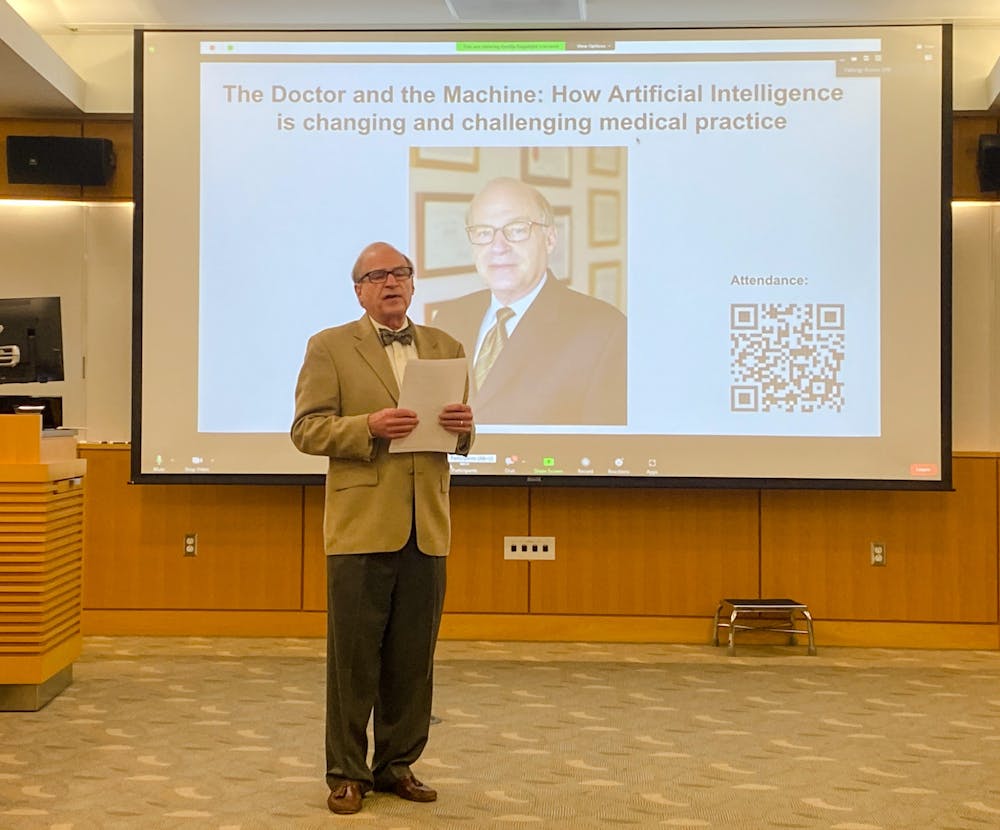The Warren Alpert Medical School's Healthcare in America elective hosted Steven Wartman, an expert in managing academic health centers, for a talk on the use of artificial intelligence in medical practice titled “The Doctor and the Machine” Tuesday afternoon.
Wartman, an internist and sociologist, is the former president and CEO of the Association of Academic Health Centers and previously served as the Dean of the School of Medicine at the University of Texas Health Science Center. He also worked at Brown in his career, founding the Division of General Internal Medicine and the General Internal Medicine Residency Program at Rhode Island Hospital, according to a Today@Brown announcement.
“Throughout his career, Wartman has been internationally recognized for his work that has included leadership, organization, management, strategic alignment, problem-solving and changing health care,” said Emilija Sagaityte ’22 MD’26, a student co-leader of the Healthcare in America elective and former senior editor at The Herald, in her introduction of Wartman.
During his talk, Wartman focused on how advances in artificial intelligence are transforming medical practice and doctor-patient relationships. In his discussion, Wartman cited the rising performance of machine learning models on pattern-matching in medical imaging, personalized medicine and the use of big data in symptom monitoring as some of the factors leading to a rapidly changing health care landscape.
He pointed to certain estimates which predict there could eventually be as many as 10,000 data points on any patient. “This requires physicians to have a deeper understanding” of statistics and probability than needed in the past, Wartman said at the event.
It’s not only important for physicians to understand how data works, but also know how to effectively communicate conclusions from the data to their patients and patients’ families, he added.
Wartman said he believes that the increasing prevalence of AI is “an existential threat” to the role of the physician.
In his speech, he mentioned that he led a seminar at a technology conference on the question of whether physicians would be replaced by AI. There, he asked the audience, consisting of those working in the tech industry, to take a vote: “How many people here think that physicians will be replaced in the next 20, 30, 40 years?” About 90% of those present said yes, he reported. Wartman pointed to the improved accuracy of machines in recognizing patterns in X-ray studies and their ability to interpret big data as reasons why machines might replace certain responsibilities of physicians.
Wartman also emphasized that although medical technology is transforming medical practice, physicians are focused on compassion and centering people, so their role with patients should remain fundamentally the same despite the increased presence of AI.
Wartman said that people unfamiliar with AI think of the technology as similar to human thinking, but much faster. “But that's not what machines do, even with deep learning and neural networks. It's data-driven, number-crunching (algorithms) that's going on with machines. It's not the kind of human reasoning that we're talking about,” Wartman said. “So I would define the physician’s role … as providing care that is valued beyond algorithms.”
Wartman concluded his talk by advising audience members that in order to “preserve the patient-physician relationship in the age of AI, physicians must serve as the compassionate humanistic interface between patients and machines.”
Silas Monje ’21 MD’25 said his most important takeaway from the talk was hearing about all the impacts AI already has. “It’s surprising to see that (some) data scientists believe that physicians will be replaced. I don’t think it’s actually going to happen, but it’s interesting to hear that point of view,” Monje said.
The Healthcare in America elective, which gives medical students, Program in Liberal Medical Education students and Medical Science Masters’ students an opportunity to hear from a variety of perspectives in public health that can better inform them as members involved in the health system, Sagaityte wrote in an email to The Herald. The organizing team of the elective felt that Wartman’s experiences, including at Brown, aligned with the perspectives that the course aimed to offer, she added.





